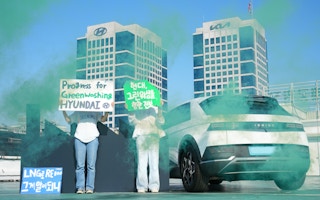Hyundai has come under fire for announcing a plan to build a natural gas-fired power station soon after pledging to use only renewable energy.
To continue reading, subscribe to Eco‑Business.
There's something for everyone. We offer a range of subscription plans.
- Access our stories and receive our Insights Weekly newsletter with the free EB Member plan.
- Unlock unlimited access to our content and archive with EB Circle.
- Publish your content with EB Premium.
On 9 May, less than two weeks after the Korea automaker joined the RE100, a global club of big corporations that have committed to use 100 per cent renewables, the company said it would be building a large-scale liquid natural gas (LNG) power plant at its flagship manufacturing facility in Ulsan, South-east Korea.
The 184-megawatt plant is projected to supply 70 per cent of the power Hyundai needs to run its main vehicle production base in Korea, and is slated to be operational by 2025. The manufacturing plant produces Hyundai’s electric vehicles, including its flagship Ioniq 5 marque.
The plant has been billed as a way for Hyundai to help Korea reduce carbon emissions and meet national climate goals, since natural gas is less carbon-intensive when burned than other fossil fuels. This rhetoric is in line with the Korean government’s decision to label natural gas as green in its taxonomy for green fuels, as the country aims to transition away from coal.
Hyundai has said it is difficult to source renewable energy in Korea, and that LNG power plants can improve energy efficiency and reduce carbon emissions. It added that the LNG plant could be converted into a hydrogen plant in the future, which would help to further reduce emissions.
“
The new fossil plans indicate Hyundai’s goal in joining the global [RE100] initiative is little more than greenwashing.
Greenpeace Korea, Friends of the Earth Korea, Youth4ClimateAction
Hyundai’s RE100 pledge committed the company to phase out fossil fuels completely between 2040 and 2050, in line with its goal to be carbon neutral by 2045. Climate Group, the non-profit behind RE100, told the Korean press on Sunday that it was not aware of Hyundai’s plan to build the Ulsan plant when the company signed up to RE100 and has asked for an explanation.
Hyundai has not responded to Eco-Business’ request for a comment.
A coalition of non-government organisations, including Greenpeace Korea, Friends of the Earth Korea, and Youth4ClimateAction, said that Hyundai’s planned gas plant is “contrary to the mission of RE100”, which aims to send a signal to the market and governments to hasten the shift to zero-carbon electricity grids.
“The new fossil plans indicate Hyundai’s goal in joining the global initiative is little more than greenwashing, in order to burnish the company’s reputation for sustainability,” the group said in a statement, published on Monday.
The group noted that natural gas will play as big a role as new coal investments in exacerbating climate change if all planned global gas projects go ahead, and Hyundai may end up emitting more carbon from its own gas plant over its estimated 25-year lifespan than if it procured electricity directly from the national grid.
It added that the Ulsan plant will make it harder to achieve domestic and global climate goals — Korea aims to cut 40 per cent of its carbon emissions by 2030 and achieve net-zero by 2050 — and flies in the face of an International Energy Agency report last year that highlighted the role of methane — a powerful climate agitant released when gas is produced and transported — in accelerating climate change.
The plant is also of risk of becoming a stranded asset, the group pointed out, given the volatility of LNG prices and the falling cost of renewables. A report published earlier this month by TransitionZero, a climate analytics non-profit, found that natural gas has lost its value as a crucial “bridge” fuel in the energy transition, because of rising gas price volatility since the Russian invasion of Ukraine and the falling cost of renewables.
The group added that by the time Hyundai completes the LNG power plant in 2025, solar power facilities with battery storage capacity are expected to be cheaper than new gas plants.
Borim Kim, an activist for Youth4ClimateAction, said: “The president of Hyundai Motors, Jaehoon Chang, said the other day [in September 2021, when the firm announced it would be carbon neutral by 2045] that climate change is an undeniable challenge that needs everyone’s utmost and urgent attention’. It is difficult to understand Hyundai Motors’ decision if they really believe climate change needs urgent attention.”
The group has called on Hyundai to scrap the plan for the plant.










